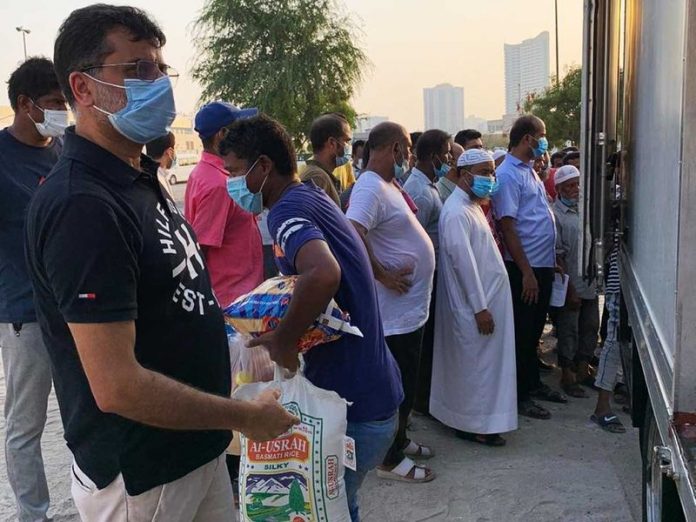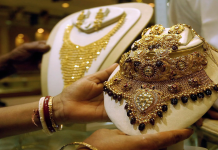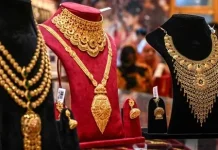
It’s been a year since the National Disinfection Programme was rolled out in the UAE to fight COVID-19. March 26, 2020, marked a turning point in the UAE’s fight against the global pandemic.
That was when community groups in the country started to rally around the UAE’s efforts to tackle the coronavirus. Volunteers from all communities put their lives on the line to help the distressed. Some of them died, and many of them contracted the virus. But that didn’t stop the volunteers from helping people who needed it the most.
Here we look at some of the community efforts to help rein in COVID-19 infection.
How communities rallied during the pandemic
Sajila Saseendran, Senior Reporter
Sreevidya Manoj was running a high fever. She had trouble breathing. The symptoms were very obvious. It must be COVID-19, she thought. Panic swept over her. She didn’t know whom to call for help. How does she go about it?
The Sharjah resident’s problems multiplied as her husband, daughter, and brother too fell ill. Word got out that the family was suffering. The news reached a Kerala Muslim Cultural Centre unit in the UAE, and their volunteers swung into action.
“There was a delay in getting people admitted due to the high number of cases those days. But, KMCC helped us,” Sreevidya said.
Her husband, daughter and brother, who also tested positive, were admitted to Dubai hospitals, thanks to KMCC’s efforts.
“They were prompt in following up. I don’t have words to thank them for the timely help,” said Sreevidya, who works in the financial sector.
Sreevidya’s experience is not an isolated one. The KMCC volunteers worked round the clock, helping the coronavirus-stricken expats in the UAE.
KMCC was one of the several organisations that braved COVID-19 to bring relief and provide food and medicines to communities in the UAE. The Pakistan Association in Dubai was a source of strength to the community as they took care of COVID-19 patients who hailed from Pakistan.
Volunteers from all communities put their lives on the line to help the distressed. Some of them died, and many of them contracted the virus. But that didn’t stop the volunteers from helping people who needed it the most.
–
For the Filipinos, there was no particular group engaged in relief efforts. Instead, a motley bunch of Filipino volunteers served as community watch, providing information on coronavirus and catering to the needs of their countrymen.
The Sri Lankan Welfare Association — Sahana led the efforts to provide food and shelter to Sri Lankans who suffered from the fallout of the global pandemic.
While community groups took care of people from their countries, many UAE residents found creative ways to help their friends and neighbours in need without shelling out a single dirham. They bartered goods to help people.
As the world shuddered under the onslaught of the coronavirus, the best of humanity rose to the surface. Heartwarming reports of people risking lives to help others in times of distress restored faith in humanity.
The Kerala Muslim Cultural Centre was one such organisation. KMCC Dubai was among the first community groups to reach out to stranded Indians in the early days of the epidemic.
What’s Kerala Muslim Cultural Centre?
An affiliate of the Indian Union Muslim League, the Kerala Muslim Cultural Centre is an organisation formed in 1981 for expatriates from the southern Indian state of Kerala. With a strong presence in Gulf countries, KMCC has been involved in charity, education and cultural activities. They have built homes for the homeless, provided medical aid to the poor, helped marry off girls from vulnerable families, and funded the education of eligible students.
In the UAE, KMCC has served Indians, especially Malayalees, in times of need for over 50 years. KMCC Dubai is licensed by the Community Development Authority in the emirate.
Although most of their units are in the Gulf, KMCC also works out of the US, Canada, Australia and Malaysia, assisting people in turbulent times.
Our members from different walks of life contributed as we have the motto: We are with those who have nobody with them.
– Kerala Muslim Cultural Centre
How KMCC volunteers helped Indian expats
COVID-19 is a global pandemic, and the coronavirus is to be feared, but that didn’t stop the KMCC volunteers. A pandemic is a time when people needed help. Thousands lost jobs and needed food and shelter. Those struck by the virus required medical assistance. It is a humanitarian crisis.
The UAE has handled the situation well enough to prevent the medical infrastructure from being overrun. But expats in trouble needed help. And here’s where KMCC played a vital role in alleviating the pains of the Indians.
HIND HUMANITARIAN CITY
■ The Hind Humanitarian City, the largest isolation unit set up in the region during the peak of the pandemic, was opened at Al Warsan, Dubai, based on a proposal from the KMCC.
■ The buildings, donated by Al Wasl Properties, were transformed into an isolation and quarantine facility after KMCC volunteers formed a crisis management unit and set up the first unit by assembling 500 beds.
■ Dubai Health Authority offered medical services. KMCC volunteers furnished the buildings, managed the housekeeping and provided a central room service.
■ KMCC volunteer doctors and nurses ran the first four buildings, which grew in number with others like Aster DM Healthcare, NMC Healthcare, Pakistan Association Dubai, Fathima Healthcare Management Services, the Indian Consulate in Dubai, TKM Engineering College Alumni and AKCAF pitching in.
■ KMCC volunteers managed around 7,500 beds.
■ Community groups of expats from other countries too pitched to help their countrymen lodged at the Hind Humanitarian City.
How KMCC repatriated stranded people
KMCC filed a petition at the High Court of the southern Indian state of Kerala seeking flight services to repatriate stranded Indians in the UAE. Licensed by the Community Development Authority in Dubai, KMCC Dubai opened a Help Desk to register the Indians wishing to be repatriated.
When the Indian government began repatriation flights from May 7, 2020, KMCC volunteers, among others, helped the Indian Consulate in Dubai to finalise the list of passengers based on compelling reasons for travel.
When India allowed the repatriation of stranded Indians registered with the missions to be flown on charter flights, KMCC units swung into action. “About 175 flights were chartered by KMCC units across the UAE. They flew around 37,800 passengers,” said Dr Puthur Rahman, president of the UAE KMCC National Committee.
Apart from pregnant women, the repatriated passengers included the elderly, patients seeking treatment back home, people who lost jobs and stranded visitors.
“Around 4,000 of them were given free tickets as we sponsored around 10 to 15 per cent of tickets on each flight. Additionally, two charter flights were sponsored in partnership with the chairman and managing director of Lulu Group, M.A. Yusuffali. Around 350 people flew on those flights,” Dr Rahman said.
KMCC also helped Indian expatriates from neighbouring countries who were stranded in the UAE when Saudi Arabia and Kuwait closed their borders and suspended flights to prevent the spread of COVID-19. Hundreds of Indians returning to their work places were stranded, and KMCC provided them food and shelter in December and later made travel arrangements in January.
What they said about KMCC’s work
Abdul Khader and Shabeer Ali, Dubai
Abdul Khader and Shabeer Ali lived in an accommodation shared by 14 people working in shops in Naif, Dubai. A couple of roommates first developed the typical symptoms and tested positive for coronavirus. “They were taken for isolation by volunteers from Dubai KMCC (Kerala Muslim Cultural Centre),” Abdul Kader said.
Within days, 11 of them, including Abdul Kader, also contracted the virus and were isolated with KMCC volunteers’ help.
They lived in an accommodation shared by 14 people working in shops in Naif, Dubai…11 of them contracted the virus. They were taken for isolation by volunteers from Dubai KMCC.
–
“From day one, KMCC volunteers had started giving us food,” said Shabeer Ali, who was among the three who remained in the room later as they were not tested because they did not show any symptoms.
“We couldn’t go to work or step out those days. We survived on food distributed by KMCC. They got us provisions and also cooked meals for about two months. We have no words to thank their selfless service, risking their lives,” said Shabeer.
Manju George, school bus attendant, Dubai
A school bus attendant, Manju George lost her job after she became pregnant. She was among the stranded Indians repatriated in flights chartered by KMCC.
“I was struggling after losing my job. So my husband and I had to vacate our flat. He went to his company accommodation, and I stayed with my friends who shared a room,” Manju told Gulf News over the phone from Kerala.
“I was desperate to fly home as I had only a few weeks left to remain fit to fly. It was KMCC who prioritised my case and accommodated me in one of the flights they chartered. My husband’s company paid for the ticket. They also paid my room rent for two months, and they gave my roommates food even after I left. I will never forget their help. I still pray for those volunteers,” said Manju, who gave birth to a girl in Kerala.
Tributes and plaudits for KMCC volunteers
KMCC lost three volunteers to COVID-19, and a majority of the volunteers contracted coronavirus. That didn’t stop the community service. On recovering from their infections, volunteers rejoined the group to help serve the people struggling from the fallout of COVID-19. While the volunteers toiled, KMCC sent monthly groceries for their families back in Kerala as a token of appreciation, said Ibrahim Khaleel, acting general secretary of KMCC Dubai.
■ KMCC honoured all the volunteers at a special function.
■ KMCC was the only expat organisation that participated in the “Your City Needs You” campaign, according to a list of humanitarian organisations announced by the Dubai Media Office.
■ The Watan Al Emarat Foundation honoured the group for its matchless service to the country during the pandemic.
■ KMCC also organised an event to honour government departments and other social organisations and community groups that contributed significantly to the fight against the pandemic.
■ Indian Associations in Sharjah, Ajman, Umm Al Quwain and Ras Al Khaimah, Indian Social Centre in Abu Dhabi, All Kerala Colleges Alumni Federation, Incas, Norka, United PRO Association, Odiya community groups, Orma, Tamil Ladies Association, Purawanjal Milan, BAPS Hindu Mandir, Guru Nanak Darbar Gurudwara are among the Indian community groups that supported expats with food, masks and sanitisers and air tickets during the pandemic.
We [Pakistan Association Dubai] had set up a system of emails [to find out people’s needs]. We had about 25 volunteers delivering packets to their doorsteps. We helped around 11,000 families…for at least three months from March.
– Rizwan Fancy, PAD’s director of welfare
Pakistan Association Dubai: A true friend in need
Suchitra Bajpai Chaudhary, Chief Reporter
The Pakistan Association in Dubai (PAD) came to the rescue of Pakistani families during the pandemic. Rizwan Fancy, PAD’s director of welfare, said the community came together with the help of the association.
He told Gulf News: “In the last few months since March 2020, when the sanitation programme began, we supplied food packets, medicines, groceries, cash and air tickets to the people in distress. We had set up a system of emails. Since people could not come to the consulate, we asked them to send emails listing their needs. We had about 25 volunteers delivering packets to their doorsteps. We helped around 11,000 families from Dubai, Sharjah, Ajman, Khor Fakkan and other places for at least three months from March.”
Volunteers would pick up the food packets, which consisted of 10kg rice, flour, 3kg lentils, cooking oil, tea leaves, coffee, sugar, milk powder and other essential provisions to last a month, which was dropped at the doorsteps of the needy.
HOW PAD HELPED PAKISTANI EXPATS
■ During Ramadan, PAD ran a camp at Jebel Ali and delivered about 2,500 food packets per day for 30 days. People could walk into the camp and pick up their packet for the day.
■ For bachelors in shared accommodation, PAD gave cash to those who needed money. “We also gave out Dh300 vouchers to purchase groceries from Lulu supermarkets. We also supplied basic medicines to the sick,” said Rizwan Fancy, PAD’s director of welfare.
■ PAD worked closely with charity organisations and groups to repatriate more than 11,000 people by providing free tickets. “We gave 400 tickets, and we collaborated with other organisations to arrange charter flights,” Fancy said. PAD also helped repatriate three seriously ill patients free of cost during the pandemic, footing the bill of Dh23,000 per person.
■ For three months, PAD took charge of the facilities at the COVID-19 isolation facility in the Al Warsan complex to help Pakistani expats who tested positive.
Message to the Pakistani community
Fancy says that when people come together and act collectively in times of crisis, all major issues can be resolved. “PAD, a charity wing of the Pakistan Consulate, is deeply thankful to numerous selfless people who helped financially and made important contributions. Without them, it would not have been possible for us to organise this massive operation. I am also thankful to the police, civil defence, ambulance and health sector in UAE for working closely and standing by us in the hour of need.”
Filipino volunteers and community watch
In March last year, a group of Filipinos volunteered to serve as community watch — going from house to house, asking residents about their requirements and disseminating information on the coronavirus. They were among the first to respond when the UAE government called for community volunteers.
The task was taxing yet fulfilling, they said. They were afraid of catching the virus but took pride and satisfaction in being volunteers who supported the country’s overseas workers in the fight against the global pandemic.
Ibrahim Robel Beltran, one of the team leaders of Filipino volunteers, said: “There were 25 of us in the group, which distributed in various clusters in Al Rafa, Mankhool, Al Fahidi and other areas of Bur Dubai. Other volunteer groups composed of various nationalities were also distributed across the city.”
The task was taxing yet fulfilling [for the volunteers]. They were afraid of catching the virus but took pride and satisfaction in being volunteers who supported the country’s overseas workers in the fight against the global pandemic.
–
“As volunteers, we assisted authorities in urging people to follow the precautionary measures such as wearing face masks and hand gloves, the importance of social distancing protocol, most importantly, to stay at home,” Beltran said.
They also played a crucial role in data gathering and contact tracing. Beltran said: “We also reminded residents to report persons who show symptoms of COVID-19 infection. We told them to be vigilant in their surroundings, cooperate, and call the relevant authorities for any findings and observation. The UAE government is always here to help us,” he stressed.
In the early months of the pandemic, some Filipino expats handed out free face masks in Dubai and Sharjah, following reports of shortages at most pharmacies.
Basketball fundraisers for typhoon victims
Bound by the spirit of Bayanihan (communal unity and cooperation), a group of Filipino basketball players in Dubai organised friendly games to raise funds for the families affected by the super typhoons that hit the Philippines late last year.
The players, led by Arnel Fernandez, had distributed groceries to their compatriots at the height of the pandemic.
Kabayans are very dear to me, so it pains me to see many of them greatly affected by the typhoons. That’s why we have decided that all income for one day of our flagship shop in Al Rigga was used to buy essential goods for affected kabayans.
– Thampi, managing director of Coral Perfumes LLC
More kabayans (Tagalog for compatriots) helped Filipinos in distress in the UAE and their families in the Philippines. In Abu Dhabi, Em Serrano sold her make-up kit and skincare products to buy relief goods, food, medicine and other personal items for fellow Filipinos, while siblings Malou Quinto-Prado and Michelle Quinto-Guinto used their offices as drop-off centres for donations.
Moved by the Filipino spirit of cooperation, Shibi M. Thampi, managing director of Coral Perfumes LLC, helped the Filipinos. “Kabayans are very dear to me, so it pains me to see many of them greatly affected by the typhoons. That’s why we have decided that all income for one day of our flagship shop in Al Rigga was used to buy essential goods for affected kabayans. We hope that this initiative inspires other companies and individuals to do their fair share of giving back to the community,” he told Gulf News.
Sahana: Help for stranded Sri Lankans
Angel Tesorero, Senior Reporter
In August, several stranded Sri Lankans who didn’t have money to pay for accommodation were provided shelter by the Sri Lankan Welfare Association — Sahana (SLWA), a community organisation registered with Dubai’s Community Development Authority (CDA).
The SLWA housed 47 Sri Lankans and helped repatriate 18 expatriates on August 16. In their late 20s, most of them had come to Dubai in February and early March last year on visit visas looking for employment.
“They left Sri Lanka to look for suitable jobs in the UAE, but unfortunately COVID-19 happened, and they found themselves stranded. Eventually, they ran out of funds, but thankfully, several members of the Sri Lankan expat community came to their help,” SLWA volunteer Muhammed Isthiaq Raziq, 43, told Gulf News.
“Initially, we accommodated 22 distressed Sri Lankans in early August, then 10 more came to us on August 10 and another 33 by August 17, a total of 65 stranded individuals. They came to the Sri Lankan Consulate in Dubai, where SLWA volunteers have been serving free food daily from breakfast to dinner,” he added.
Community initiatives with a difference
Angel Tesorero, Senior Reporter
During the pandemic, many UAE residents found creative ways to help friends and neighbours without shelling out a single dirham. They used the age-old tradition of bartering.
Plants and handbags were bartered for bags of rice; preloved furniture and appliances for milk and canned goods; designer clothes for baby diapers, and so on. They engaged in bartering to help people during the COVID-19 pandemic and used social media to spread their message.
WHAT’S BARTER?
■ Barter is an act of trading goods or services without the use of money.
■ It is the oldest form of commerce, dating back to a time before currency existed.
■ Bartering allows individuals to trade items they own but are not used. It allows them to get items they need without paying money,
In Dubai, a Facebook group called Amicable Barter Community in Dubai (ABCD) was created on May 22, followed by the Abu Dhabi Barter Community (ADBC) on May 25.
“Our (ABCD) barter group is a place where one may find items he or she needs without spending his or her precious cash. ABCD is a community of people who amicably find value in bartering or offering and obtaining goods by direct exchange without the use of currency. But the most amazing part is seeing residents, couples or groups who have been offering needy members with packs of grocery items, toiletries and rice without asking anything in return,” said Lou Parroco, who founded ABCD with her husband Cesar.
According to Parroco, the most common items requested by members to barter were rice, baby formula, detergent powder, indoor plants and canned goods. “We saw old books exchanged for bath soap and shampoo; indoor plants bartered for two kilos of glutinous rice; a bed for an infant formula; and a Louis Vuitton iPad cover for two bags of grocery items that were donated to people who lost jobs.”
Kindness exchange
Several initiatives were also launched on social media. Stop and Help founder Heather Harries, 52, said her group is not a charity but a ‘kindness exchange’, where donors are paired with beneficiaries the group has vetted.
“Stop and Help was launched on March 22, at the onset of the COVID-19 outbreak, to match residents in need with people who could help. It started as a small Facebook page and has now grown to around 10,500 members,” Harries said.
Meals, groceries and other material support were shared with struggling families. Those seeking help filled up an online form, and donors signed in at an online ‘kindness registry.’ “We have hundreds of dads waiting to be matched with someone who can help them with basic family essentials for survival,” Harries said.
“The problem was bigger than just food. Families who have lost their jobs have also lost access to medical insurance, and we are supporting an increasing number of mums-to-be that now have nothing, not even insurance, to deliver their babies in hospitals,” she added.



